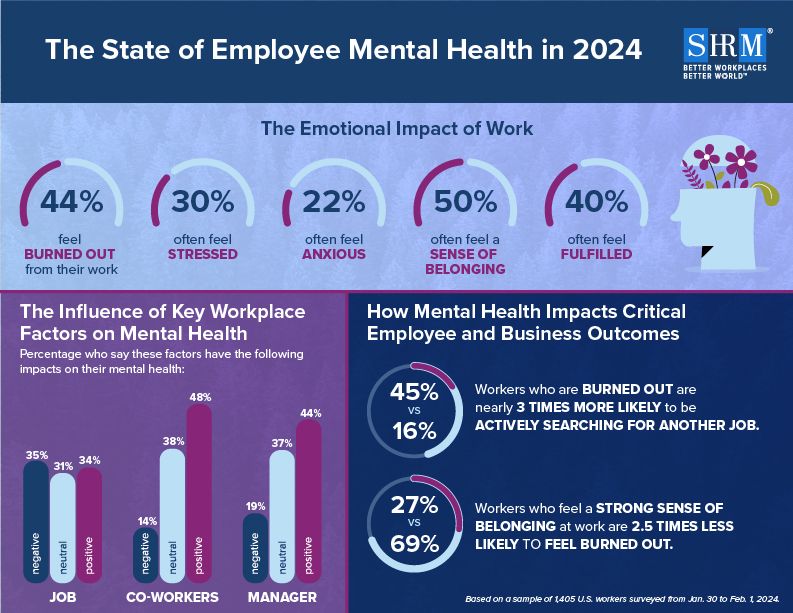For Kaitlin Howes, the topic of burnout at work hits close to home.
Howes, an HR business partner at Reward Gateway, said that at a previous employer, she was “trapped in a rigid role without a lot of flexibility,” where innovation felt out of reach. The monotony of completing the same tasks the same way each day stifled any potential for growth or learning. Collaborative opportunities were few and far between, leaving her feeling isolated.
“Every morning, I felt a sense of dread, and it was taking a toll on my mental health,” Howes said. “Burnout was right in my face, and I knew I needed to do something.”
Burnout in the workplace is not new—but it is worsening. SHRM’s Employee Mental Health in 2024 Research Series, released for Mental Health Awareness Month in May, found that 44 percent of 1,405 surveyed U.S. employees feel burned out at work, 45 percent feel “emotionally drained” from their work, and 51 percent feel “used up” at the end of the workday.
“If you consider how many workers are feeling burned out and the direct and indirect effects burnout has on an organization, it should really raise a red flag to organizational leaders,” said Daroon Jalil, a senior researcher at SHRM who led the mental health research initiative.

Burnout can have profound effects on employees, including physical and emotional exhaustion, diminished job performance, increased absenteeism, lower job satisfaction, and even long-term health problems such as anxiety and depression.
Employees who are burned out are also more likely to leave their companies. According to the SHRM data:
- Workers who are burned out from their work are nearly three times more likely to be actively searching for another job (45 percent versus 16 percent of those who did not report burnout).
- Workers who feel burned out from their work are significantly less likely to go above and beyond what is expected of them at work (40 percent versus 56 percent).
The SHRM research aligns with previous reports, including the American Psychology Association’s 2023 Work in America Survey, in which 57 percent of workers said they experienced negative impacts due to work-related stress associated with burnout, including emotional exhaustion, irritability, and anger.
When employees feel burned out, it’s not just their own productivity that takes a hit—it’s the entire team’s. Employees experiencing burnout are more likely to check out mentally, leading to reduced employee engagement and absenteeism.
Howes explained that burnout can lead to missed deadlines, lower quality work, and a general feeling of sluggishness that spreads throughout the office. Burnout can also increase turnover. When employees feel overwhelmed, unappreciated, or unsupported, they’re more likely to find another job where they feel a greater sense of purpose.
The SHRM data found that employees whose managers have a negative impact on their mental health are two times less likely to say they believe in the mission of their organization (43 percent versus 91 percent of those whose managers have a positive impact).
“Additionally, when employees are exhausted and unmotivated, they’re less likely to think creatively, problem-solve, or contribute new ideas, hindering the company’s ability to adapt to changing market conditions and stay competitive,” Howes said.
How Companies Can Address Burnout
Howes said that recognizing and addressing burnout is crucial for maintaining a healthy work environment—both for the individual who is experiencing burnout as well as organizations that are facing the effects of a burned-out workforce. As an individual, preventing burnout involves taking proactive steps to maintain a healthy work/life balance, manage stress effectively, and prioritize self-care.
“However, I believe a large part of dealing with burnout is also the responsibility of the company,” Howes added. “Organizations should always be looking for new ways to engage their workforce to promote retention and improve well-being.”
Organizations should work toward creating an environment that fosters belonging and authenticity, which can reduce burnout. The SHRM research showed that workers who feel a strong sense of belonging at their organization were 2.5 times less likely to feel burned out from their work. Additionally, employees who feel they can be their authentic selves at work are 2.5 times less likely to feel emotionally drained from their work.
Another effective way to address these concerns is with regular recognition, according to Howes.
“Organizations should encourage leadership and managers to offer regular and specific recognition for their employees’ hard work and accomplishments,” she said.
Terri Bogue, the chief operating officer of Indiana-based technology company Thor Projects, said during the SHRM Annual Conference & Expo 2022 that individuals can avoid experiencing burnout in several ways:
- Try to maintain an optimistic point of view when dealing with work challenges.
- Reframe your perceptions, because many people harbor false perceptions of the expectations others place on them.
- Give yourself some credit.
- Focus on maintaining a healthy diet, exercising regularly, taking mental health days, and seeking professional support when needed.
- Find ways to limit your demands.
“We need to make sure our expectations, perceptions, and results match,” Bogue said. “When they don’t, that’s when we experience burnout.”
An organization run by AI is not a futuristic concept. Such technology is already a part of many workplaces and will continue to shape the labor market and HR. Here's how employers and employees can successfully manage generative AI and other AI-powered systems.




